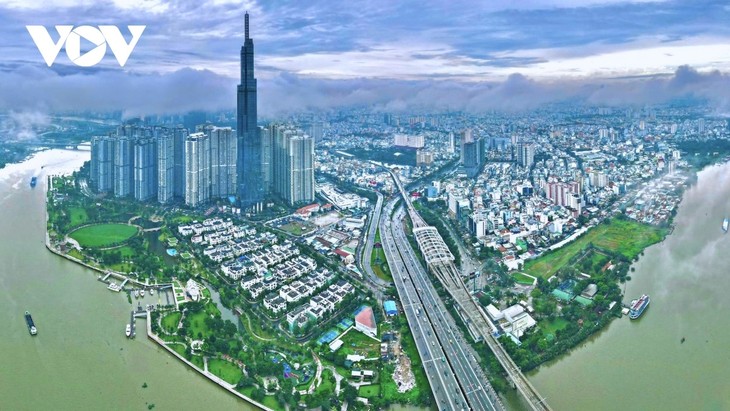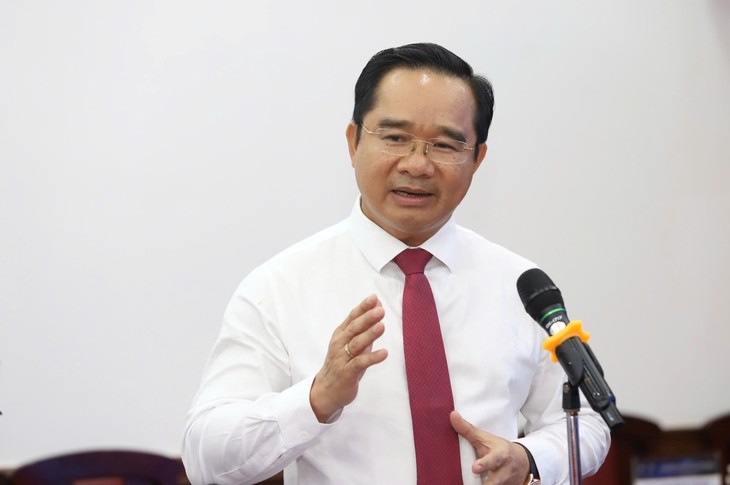(VOVWORLD) - Vietnam is taking the first steps to build a comprehensive international financial center (IFC) in Ho Chi Minh City and a regional financial center in Da Nang. The move to build the centers embodying Vietnamese characteristics is identified as a long, extremely important journey in driving Vietnam’s economic growth in the new era.
 Building an international financial center is an important step to elevate Vietnam's status. Building an international financial center is an important step to elevate Vietnam's status. |
Vietnam has outlined a roadmap with eight policy groups of which, from now until 2030, six policy groups used in major global financial hubs will align with international practices and Vietnam’s needs.
Based on this roadmap, an action plan has been created with 49 specific tasks and solutions assigned to ministries and localities to form a legal framework and prepare conditions for developing financial centers in Vietnam.
A project steering committee headed by the Prime Minister has been established. Ho Chi Minh City and Da Nang, the selected sites, are preparing resources for infrastructure development, allocating land areas, and engaging with investors and major financial institutions for policy consultation and investment attraction.
Nguyen Van Duoc, Chairman of the HCMC People's Committee, said that HCMC hopes experts, scientists, international organizations, consulting firms, financial institutions, and businesses will support the project. “The policies should be based on the experience of successful financial centers in providing resources and connecting with large potential investors,” according to Duoc.
 Nguyen Van Duoc, Chairman of the HCMC People's Committee (Photo: Nguyen Phan/nld.com.vn) Nguyen Van Duoc, Chairman of the HCMC People's Committee (Photo: Nguyen Phan/nld.com.vn) |
Da Nang is increasing its consultations and seeking advice from successful centers like the Dubai International Financial Center, said Ho Ky Minh, Deputy Chairman of the municipal People's Committee. Minh added, “Those meetings and exchanges with partners will help identify development directions for financial services at the Da Nang Regional Financial Center –services related to green finance, digital banking, fintech, and digital assets. These areas are expected to create breakthroughs for future development.”
Foreign investment will supplement domestic capital to provide the necessary financial resources for the financial centers, which will need a strong infrastructure and legal framework to effectively manage activities.
Creating transparent regulations will create a stable legal environment that encourages global investors and businesses to participate, said Warrick Cleine, Chairman and CEO of KPMG in Vietnam. He praised Vietnam's process over many decades now of developing its financial reporting rules and standards in a way that enable investors to think of accelerating the adoption of financial reporting standards, which go beyond those investors are used to using in Vietnam, but reflect international norms and standards as well.
"The Ministry of Finance have honed in on IFRS as a priority and that's something that we wholeheartedly support and think that is going to be important for the development of the IFC and for anybody playing in it as well,” said Cleine.
An international financial center is a crucial channel for raising capital to support business development and offers a way to facilitate the flow of trade and investment capital. Vietnam has clearly identified a need to build a comprehensive regulatory system with both a focus on purely financial aspects and a broader scope.
At the first working session of the steering committee on April 3, Prime Minister Pham Minh Chinh said that, as IFC development is a new topic for Vietnam, careful preparations will be necessary, and plans will need to be continuously adjusted. Special competitive policies and mechanisms aligned with Vietnam’s development needs should leverage Vietnam's advantages, such as green finance and digital finance.
Vietnam will open up its financial sector and create favorable conditions for international financial institutions to operate effectively, transparently, and fairly in line with international practices. The establishment of regional and international financial centers in Vietnam is a strategic move to enhance the national economy’s competitiveness.